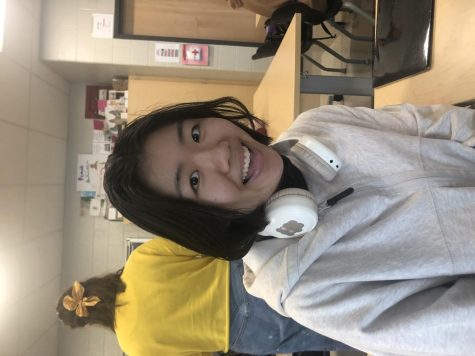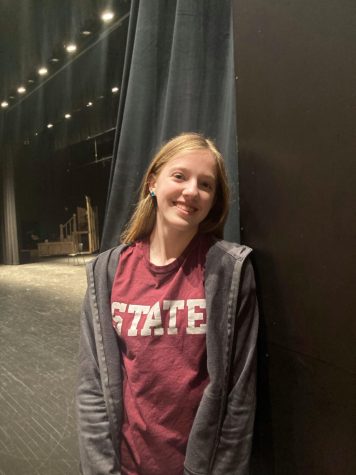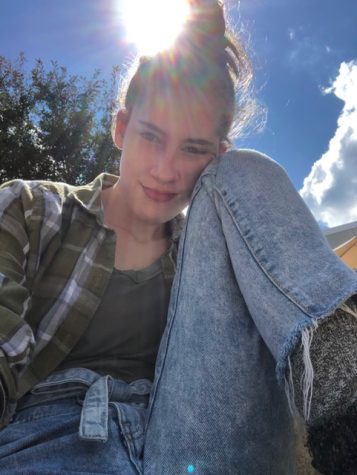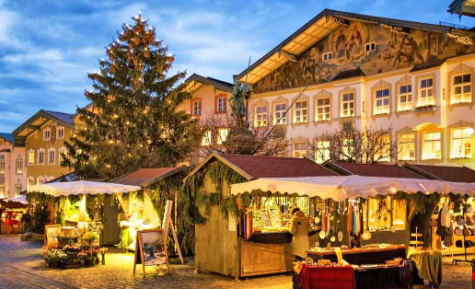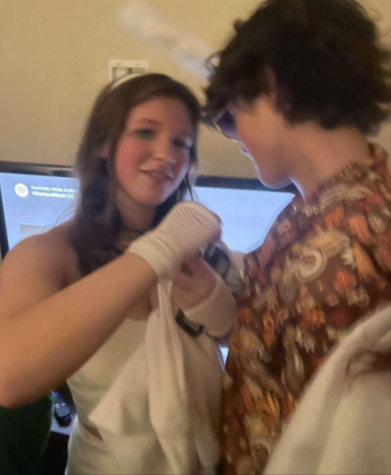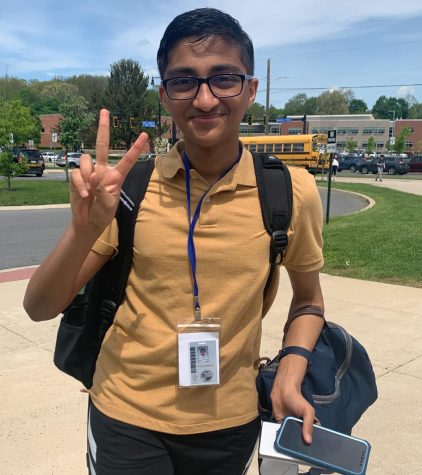State High Takes the World
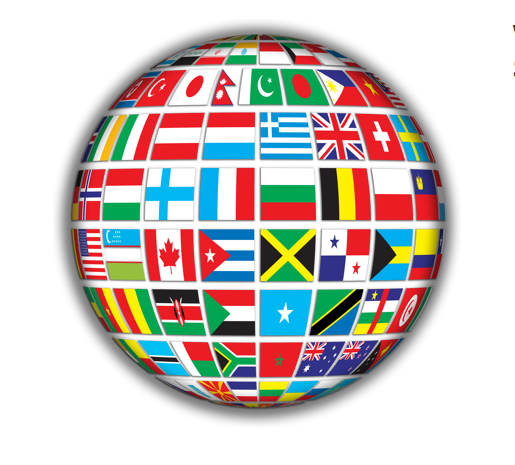
Imagine living in place where you didn’t know the language. Imagine living in a country torn by war. Imagine uprooting your life to live with a family of strangers. What if you could continue your education halfway across the world? Would you do it? At this time last year, three students from State High chose this path, participating in scholarship programs in countries around the world.
Senior Madison Krieger departed for Surabaya, Indonesia while junior Micah Hinnergardt flew to Sète, France and senior Yoga Acharya journeyed to Bosnia and Herzegovina. All three will be spending almost a year in their destinations, leaving in August 2014 and returning in July 2015. Krieger applied for travel through the Kennedy Lugar YES Abroad program on a full scholarship and was surprisingly placed in Indonesia. Like her, Hinnergardt was given no choice as to which country she could go to but said, “When I was giving my list of my top five country choices, I knew I wanted to go to Europe because it’s so easy to travel, and I have friends in Europe so France ended up on the top of my list because I already spoke some French. In January, I was lucky enough to get my first choice.”
Acharya, on the other hand, applied through the U.S. Department of State as a Kennedy-Lugar Scholar and had the choice of which country he’d like to live in. He said he chose Bosnia for its potential because of a troubled past, “I chose Bosnia because of the impact I can make to forge lasting bonds between people of the Balkans and the people of the United States.”
The journey has brought many new surprises, especially in the differences of culture. “The biggest difference has been the pace,” commented Krieger. “Indonesians live the island life, very slow and laid back and enjoy every minute whereas Americans love to be constantly going and busy. I call this the ‘Living in the Now.’” Indonesia, unlike the United States, is an island country broken up into about 18,000 islands ranging in size. Surabaya, specifically, is located on the coast in contrast to the landlocked State College.
Micah Hinnergardt, living in Séte, is located right along the Mediterranean and only two hours from Barcelona. In regards to cultural difference, she spoke of the cuisine, “I would have to say that the biggest cultural difference is the food and meal. A typical everyday dinner involves much more than it does in the United States. We occasionally start with an appetizer, maybe crackers or my personal favorite, saucisson. Then we have the main entree accompanied by a side and, of course, bread. The bread is used almost as a fourth utensil, and it rests on the table, not your plate. Then we have a bit of salad followed with some delicious cheese and finished with a small dessert. And remember, that’s a typical everyday meal, the holidays are a whole different story.”
In Bosnia, a country devastated by a brutal civil war and genocide only two decades ago, still holds the pain of its past, signs Yoga Acharya can see clearly, “There are still tensions between the different ethnicities following the atrocities following the breakup of Yugoslavia, but I have seen the country healing during my tenure in Bosnia.”
Krieger also experienced a surprise. “My biggest shock has been just how much my personal opinions and ideas have changed in just a short amount of time,” said Krieger. Someone once told me that an opinion isn’t your own until it is tested, and I think that is a really good thing to keep in mind. I am a much more opinionated person, but each opinion I have has been tested at some point or another.”
Like her, Acharya was also in for a surprise in his new home and explained, “In Bosnia, the biggest shock was encountering three distinct ethnic groups who dominate the population, and are divided along religious lines as well with Muslim Bosniaks, Catholic Croats, and Orthodox Serbs.”
Now that the three have been living abroad for six months and although life seems almost routine, Krieger admits it took some adjusting, “Surabaya is home to over 3 million people, and the average temperature is around 80 degrees everyday (even during the rainy season). I don’t have AC at my house, and in my home, I share a bedroom so privacy is hard to come by. I’ve adjusted by getting involved in clubs and activities such as running clubs, drawing classes, language lessons and learning traditional dance. Keeping busy is key to adjusting. Also learning Bahasa Indonesia, the language most commonly spoken in Indonesia was necessary to adjust.”
Acharya also dealt with complications. Living in a recovering warzone calls for adjustment of a very different level. “I live with a host family consisting of one host mother, and her kids and grandkids who regularly visit,” said Acharya. “None speak English, and I’m conversationally proficient in Serbo-Croatian. Hearing stories of her life during the Siege of Sarajevo puts everything in perspective, and has made me debate the value of life. Just yesterday, she was telling me about how the snipers were ruthless, and showed me a bullet hole in the cupboard that missed her by about a foot.” From the view of State College, everyday life and memories here are quite small in comparisons to those of Bosnian families.
In France, Micah has had little trouble adjusting, “As far as adjusting goes, I honestly don’t feel like I’ve had to do much. France and the US have relatively similar cultures, and I’ll eat almost anything so I’ve had an easy time adjusting. I just had to learn to roll with the punches and I always remind myself: it’s not better or worse it’s just different.” Still, she has had some troubles. “My biggest challenge has been adjusting to host families. Every host family has a different way of life and different habits and with every new family you have to readjust to a new life.”
School has been another big adventure, very different from State High. Education in Indonesia seemed as far away in distance as in likeness to the U.S for Madison Krieger, “I go to public school here, Monday through Friday from 6:30am to 3:00pm. Some schools go on Saturday as well, so I got lucky! High School here is grades ten through twelve, and in each grade you pick a “track” that you want to follow, either IPS (social track with classes such as sociology, economy,| math, art, history etc…) or IPA (science track consisting of chemistry, biology, physics etc…). Each class stays in the same room the entire day (no AC again), and the teachers switch rooms. Class usually lasts 1.5 hours if the teacher shows up (often they don’t and substitute teachers are unheard of). In my school there is no gymnasium or computer lab, but there is a cafeteria that has awesome food.”
Acharya has probably experienced the easiest change in school, describing it comfortably, “I am in the International Baccalaureate (IB) Program at Druga Gimnazija Sarajevo. My classes are in English, and all students speak English, but as soon as the bell goes off, you won’t hear English. The kids at school are really laid-back and fun to talk to, and a lot of them have even visited America.”
On the contrary, Hinnergardt has experienced a huge educational replacement. “I never experienced culture shock or anything like that, but I suppose that my biggest shock was how long the school days are,” Hinnergardt said. “My schedule changes everyday, but for me a typical school day starts at 8:00 and ends at 4:00 or 5:00. For some students its doesn’t end until 6:00, giving them a ten hour school day with homework do do when they get home.” But it’s not only the hours that are different. “School in France is very different from school in the U.S. and, from what I’ve been told, very different from the rest of Europe. For all of my classes, except my two electives, I’m with the exact same 27 people, and for my electives, I’m still grouped with much of my normal class. As far as class itself goes, it’s much like in the US except when we take notes, the teachers dictate and the students write exactly what they say. The students get tested much like in the U.S. with a test after each unit and then larger midterm and final-like tests. One of the biggest differences is that the students don’t really get to choose their classes. High school starts in 10th grade and everyone is required to take math, history, geography, French, English, physics, chemistry, earth systems sciences, biology, sociology/economics/political sciences, another language and at least one elective. Later in 11th grade, you choose a more precise path which you would like to take. You can choose between science, literature and business and the path that you select determines your courses for the next two years. At the end of high school everyone is required to take the BAC which is similar to the SAT except it covers every subject, including PE. The subjects that correspond to the path you chose are weighted more heavily compared to your other classes. Also, there is a very apparent hierarchy within the French school system. The teachers are much more strict than in the U.S., and the student-teacher relationship is much more formal. It’s formal to a point where, in my opinion, it is harming the education. There have been times where I know what the teacher said is false yet no one would dare to correct the teacher because in France the teacher is always right and you owe them utmost respect. Not because they deserved or earned it but simply because they are your teacher.”
Lucky for them, these students, unlike exchange students in the past, live in a generation filled with social media, giving them numerous ways to communicate beyond hand-written letters. “I Skype with friends and family when I can and am active on social media,” said Krieger. “I also have a blog that you can follow athttp://madisindonesia.blogspot.com/. Wifi can be found in just about every cafe or ‘warung’ as they are called, and Indonesians love social media so it is easy to stay connected.” Hinnergardt and Acharya experience the same ease of communication.
Although they have not yet experienced consequential rewards of their excursion back in America, they have already gained opportunities from it in their current homes. Some of these have become their fondest memories. “I have many memories, and fitting them all in would be impossible,” said Krieger. “Some include eating bakso (a traditional indonesian meatball soup) with my host sister, playing in the waves at a beach in Bali, or teaching poor school kids English and seeing them literally clinging to me trying to get me to stay after I had to leave.”
“It’s hard to pick a fondest memory,” said Hinnergardt. “I’d have to say that my fondest memory was at the end of a long day of school when I was exhausted, and I remember saying to myself that I couldn’t wait to go home. Not home to the US or anywhere else, home to my house in France. That was the day I really knew I was truly in France, and I would never be able to completely leave.” She commented on the gifts of her time so far, “So many opportunities have been presented to me since I arrived five and a half months ago. I couldn’t name all them if I tried. I’ve gotten to travel and see much of France, and I’ve met too many kind people whether it be a random guy on the bus who noticed my accent and struck up a conversation or my friends at school or all the other exchange students I’ve met during my time here. In April, I will have the opportunity to visit five other European countries and nine different cities.”
Acharya has been given a unique chance to make a great difference in the world while doing what he loves. “I’ve also had the opportunity to intern with the United Nations-International Commission on Missing Persons,” said Acharya. “I work with forensics to match DNA from mass graves with surviving family members, aiming to provide a sense of closure to those who’ve lost loved ones in the Bosnian Genocide. Many of these people live a life in limbo, wondering if their lost brother, sister, mother or father will return home. I’ve taken this opportunity to make a difference in my new community. I also have had the opportunity to teach English at the Sarajevo Center for the Visually Impaired.”
They have been learning in school, but most of Madison, Yoga and Micha’s lessons have been taught to them outside the classroom. Krieger said, “I could go on for ages, so I will make you a list. 1. What the so called ‘real world’ is like and how lucky I am to live the life I live. 2. How to deal with stalkers. 3. How to stick up for myself. 4. How to become fluent in a different language. 5. How to dance a traditional Indonesian dance. 6. How to operate every sort of social media (Instagram, FB, path, line, BBM, snapchat etc…). 7. Family doesn’t have to mean you are blood related. 8.Always say yes to an adventure. 9. Durian tastes as bad as it smells. 10. Stay open and positive and good things will come your way. 11.Spicy in Indonesia means ‘Burn your tongue out spicy’ in American terms.”
Time in another country can also put things in perspective. “The biggest thing my time here as taught me,” said Hinnergardt, “Is to just go with the flow, and that charades is a completely acceptable form of communication. Before I left I always wanted to have thing planned out and know what’s happening but now I’ve learned to just go with it and I’ll end up where I end up. Half the time I don’t know where we’re going until we get back. When its hard to understand the conversation or even to ask question you learn to just smile and go with whatever happens.”
They may have come from America, but pieces of their countries will be coming back with them. “I hope to come back to America a more aware Madison,” Krieger remarked. “More aware of the person I am as well as the part that we all play in this big game called life, I hope to bring back my knowledge, experiences, stories and pictures in order to break stereotypes and educate others on what living in Indonesia and a developing Asian country is really like.” After 11 months, a place begins to feel something like home.
Hinnergardt, too, hopes to bring her new home back with her. “I hope to bring a bit of France back with me,” said Hinnergardt. “France has such a reputation for being dirty and filled with rude people but it’s not that at all. Granted, just like any country, there are the people who always seem to be in a bad mood but in general the people here are extremely kind and sympathetic. I just hope that I can bring some of that with me and show that France isn’t just one big rude stereotype”
Yoga, after his time said, “I hope to share the many unique aspects of Bosnian culture Stateside, along with bringing back to America a renewed sense of community.”
As the three State High students continue their pursuits around the world, they continue to be enriched in their respective foreign cultures.
Your donation will support the student journalists of State College Area High School. Your contribution will allow us to purchase equipment and cover our annual website hosting costs.



